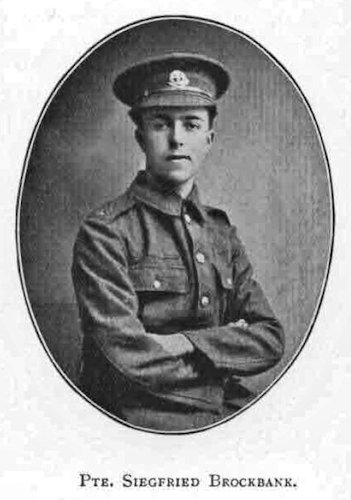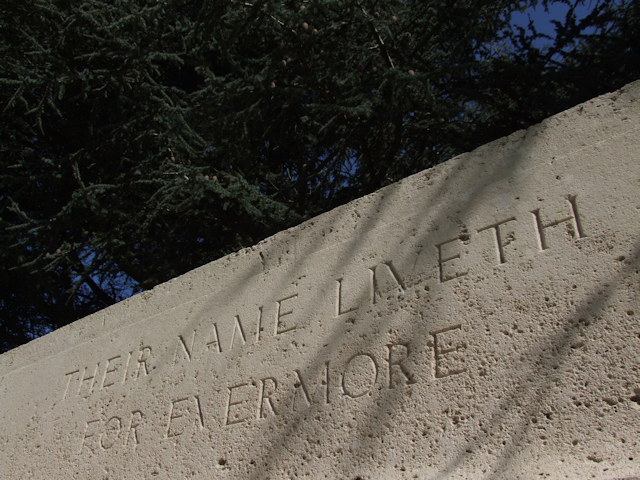Name
Siegfried H Brockbank
Conflict
First World War
Date of Death / Age
05/06/1915
20
Rank, Service Number & Service Details
Private
2559
Duke of Cambridge’s Own (Middlesex Regiment)
1st/7th Bn.
Awards: Service Medals/Honour Awards
Not Yet Researched
Cemetery/Memorial: Name/Reference/Country
FAUQUISSART MILITARY CEMETERY, LAVENTIE
K. 1.
France
Headstone Inscription
Not Researched
UK & Other Memorials
St Edmunds College Memorial, Old Hall Green
Biography
The following text was transcribed from The Edmundian (1914-1919) – The contemporary magazine of St Edmund’s College:
The first section was written by Seigfried before his death and published afterwards. The second is the College's obituary.
We have been out of the trenches since Thursday, so we are having an easy time. We carry coke and wood in with us for fires in buckets, but these usually burn out at critical moments. If old soldiers' are with you they usually monopolise the warm glow. The trenches on the first Occasion I was in were very depressing—a dozen or two dead lying about unburied. as a heavy engagement had preceded me. The last time was better and the casualties very few indeed. Shells are my bane. The village in which I am billeted is half ruined by periodical bombardments. We had one today. They make a rattling noise, sound just as if they were going to alight on your own devoted head, but up till now the other end of the village has suffered.
The commissariat is splendid, and one can also buy butter, eggs, chocolate, coffee, bread and other luxuries if one has the money.
Before the scourge, as we call the attack we Made or helped to make on the 9th, I had been feeling rather seedy for some time back, hut. I recovered just in time, and was luckily feeling fit. On the 7th I took part in what Eyewitness in the Daily Telegraph of the 18th describes as a brilliant little affair of outposts, which took place in front of our trenches. The next platoon to us was holding the head of a sap, a sort of. trench that ran from our fines slantwise up to within 80 yds. of the German trench. On the night of the 7th some 20 Allemands raided the head and got in, but were speedily put to flight. We had sustained a few casualties, but they left four dead on the spot. While it was going on, a wounded fellow of ours, rushed up and said that the Germans were inside the sap. You can imagine the feelings with which I, one of the first to reinforce, went up this sap in the pitch darkness, expecting every moment to find the Germans in possession. Luckily it was all over, except for an anxious all-night watch, The next evening was filled with preparation for the attack. Wire-cutting parties, ladder carrying parties, grenadiers, and lastly the assaulting troops coming in at night. We were moved a little in rear occupying a redoubt. After our bombardment, we saw our fellows going over the parapet, their bayonets gleaming in the lovely sunshine - a stirring sight. We heard they had carried three lines of enemy trenches. Then the Germans shelled us, being the supports, and I think the strangest of us got terrified as the shells burst all around us. We were all heartily glad when in the evening the order came to man the trenches, and we found our fellows had been beaten hack. The trench (our firing trench) was full of the remnants of the battalions and the whole air alive with hubbub. The Germans turned a heavy machine gun fire on to us, and the artillery started sending red-hot shells across the black sky. Morning revealed many painful sights, hut we were glad to hear that the French had advanced considerably at the same time as we made our attack We had drawn their reinforcements to .us. I do not think our casualties were over heavy, as very many wounded crawled back under cover of night, and they will mostly recover. I have taken on a job the nature of which I must not mention, which precludes me from the trenches for a little while.
Obituary:
To those who remember Siegfried Brockbank during the time he spent at the College, the words of his commanding officer show that what we might well have expected of him in fact came to pass. In the letter addressed to his mother, announcing the sad news of his death, the officer wrote - "During the period in which I have had your son under my command, I have got to know and respect him as a thoroughly good soldier . . . He was always bright and cheerful, and he went about his work with a cheery good will."
Siegfried Brookbank, after spending five years at Westminster Cathedral Choir School, came to St. Edmund's as a Church student in September. 1908. He was placed in the Second School of Rudiments, but showing more than average ability, was promoted to the First School of Rudiments at the beginning of the Spring term, 1909. At the end of the year, feeling that he had no vocation to the priesthood, he left the College and returned to the Choir School, where he remained for about a year.
In October, 1910, he entered the Civil Service, but only remained there eighteen months, as by that time a position in a London bank was offered him, which he accepted. In this profession he was making rapid progress when the war broke out. Cheerfully sacrificing all future prospects, he was among the first to join the New Army, enlisting in the 7th Middlesex Territorials in the early weeks of August. Owing to previous experience in the Civil Service Cadet Corps he was dispensed from preliminary training, and on September 2nd he left England to take up garrison duty at Gibraltar.
After six months spent at the Mediterranean fortress, he returned to London about the middle of February. His stay in England was of the briefest, for on March 12th he left for active service in France.
In the letters that reached us from time to time he showed the same cheerful spirit that had characterised him during his schooldays, although it was quite evident that he was taking part in some of the fiercest and most trying engagements of the war.
In a letter dated May 27th, 1915, he wrote to say that a task had been allotted to him the nature of which he was not at liberty to make known, that which would keep him from the trenches for some time. Our hopes at once rose that at least for some weeks to come he would be out of the danger zone. from subsequent information it appears that the task referred to above was connected with the trench headquarter staff, which occupied a position some 200 yards behind the firing trenches. Here. however, the security was more apparent than real, for on the 5th June, the enemy finding the range of the position, by means of their aeroplanes, subjected it to heavy shell fire. Then it was that he received several wounds; but we learn from the account afforded by the doctor who was attending him, and who was himself wounded in doing so, that death was due, not to the wounds received, but to the shock. He expired a few minutes later without regaining consciousness.
Our deepest sympathy goes out to his sorrowing parents for the loss of their only son, who, at the age of twenty, was called upon to make the greatest sacrifice that is ever demanded of man. Mass was offered for the repose of his soul as soon as the news of his death reached the College.
J.J.
W. J. H.
Acknowledgments
Jonty Wild, Di Vanderson, The Edmundian (1814-1819) – The contemporary magazine of St Edmund’s College



